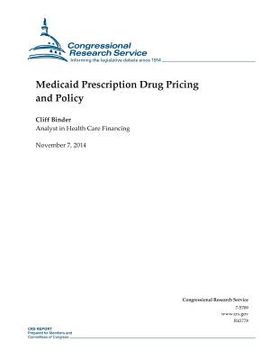Share
Medicaid Prescription Drug Pricing and Policy (in English)
Congressional Research Service (Author)
·
Createspace Independent Publishing Platform
· Paperback
Medicaid Prescription Drug Pricing and Policy (in English) - Congressional Research Service
$ 15.96
$ 19.95
You save: $ 3.99
Choose the list to add your product or create one New List
✓ Product added successfully to the Wishlist.
Go to My WishlistsIt will be shipped from our warehouse between
Monday, July 08 and
Tuesday, July 09.
You will receive it anywhere in United States between 1 and 3 business days after shipment.
Synopsis "Medicaid Prescription Drug Pricing and Policy (in English)"
Medicaid is a federal-state entitlement program that pays for health care and related services on behalf of certain low-income individuals. Prescription drugs are an optional Medicaid benefit and all states cover outpatient drugs. States can create formularies, or lists of preferred drugs, but federal rules tend to result in comprehensive coverage, even for beneficiaries enrolled in Medicaid managed care plans. Pharmaceutical manufacturers that voluntarily participate in Medicaid are required to pay rebates to states on covered outpatient drugs, which help Medicaid receive manufacturers' lowest or best price. States then share the rebate they receive from pharmaceutical manufacturers with the federal government. In determining the amount of rebate, Medicaid law distinguishes between the following two drug types: (1) single source drugs (brand-name drugs) and innovator multiple source drugs (brand-name drugs that now have generic competition); and (2) all other, non-innovator, multiple source (generic) drugs. Rebates for the first category of drugs-drugs still under patent or those once covered by patents-have two components: a basic rebate and an additional rebate. In addition to basic and additional rebates, most states negotiate supplemental rebates with drug manufacturers, by offering to encourage use of a manufacturer's product in exchange for a price concession (rebate). States, through retail pharmacies, purchase drugs on behalf of Medicaid beneficiaries. Medicaid pharmacy reimbursement has two components: a payment to cover the cost of the pharmacy buying the drug (ingredient cost) and a payment for the pharmacist's services in filling a prescription (dispensing fee). States set reimbursement for both ingredient costs and dispensing fees.
- 0% (0)
- 0% (0)
- 0% (0)
- 0% (0)
- 0% (0)
All books in our catalog are Original.
The book is written in English.
The binding of this edition is Paperback.
✓ Producto agregado correctamente al carro, Ir a Pagar.

